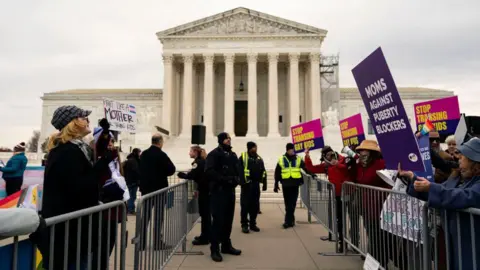US Supreme Court upholds Tennessee ban on gender transition care for minors
 Bloomberg via Getty Images
Bloomberg via Getty ImagesThe US Supreme Court has upheld a Tennessee law banning gender transition care for young people, in a decision expected to have consequences nationwide, given that 25 states have similar laws.
The justices voted 6 to 3 that the 2023 law restricting minors' access to treatments such as puberty blockers was not discrimination.
Three Tennessee transgender teenagers, their parents, and a doctor who provides transition medications had argued the state's ban violated a US constitutional guarantee of equal protection under the law by discriminating on the basis of sex.
The case, known as United States v Skrmetti, was the first time the court had taken up transgender healthcare.
The decision was written by Chief Justice John Roberts, who said that the law, known as SB1, does not discriminate against transgender people.
He also wrote that: "Tennessee concluded that there is an ongoing debate among medical experts regarding the risks and benefits associated with administering puberty blockers and hormones to treat gender dysphoria, gender identity disorder, and gender incongruence."
"SB1's ban on such treatments responds directly to that uncertainty," he concluded.
The Tennessee law bans any procedure that enables "a minor to identify with, or live as, a purported identity inconsistent with the minor's sex" or that treats "purported discomfort or distress from a discordance between the minor's sex and asserted identity".
Treatments such as puberty blockers and hormone therapies are used for a range of medical conditions. The Tennessee families who sued said their children are being unfairly targeted because the law still allows minors with other medical needs to receive the medications.
They also argued the ban violated a parent's right to access necessary care for their children.
The three liberal justices - Sonia Sotomayor, Elena Kagan and Ketanji Brown Jackson, dissented from the ruling.
Sotomayor, who wrote the dissent and also read it from the bench to emphasise her strong disagreement, wrote that the ban does lead to "medical discrimination on the basis of sex" and that in its ruling "the Court abandons transgender children and their families to political whims".
"[The Court] authorizes, without second thought, untold harm to transgender children and the parents and families who love them," Sotomayor wrote.
Former President Joe Biden's administration had joined the case in support of the families. President Donald Trump's administration then notified the court this year that it did not stand by the previous government's arguments, but it would still allow to case to continue so the court could weigh in.
Tennessee's Attorney General Jonathan Skrmetti on social media called the decision a "landmark victory".
"This is a big win for evidence-based medicine, this is a big win for democracy, for letting state governments decide what state laws should be," he said.
Skrmetti and Tennessee have argued this type of ban is necessary because of the "irreversible" nature of gender-transition treatments.
But transgender advocates have disagreed, saying drugs like puberty blockers are fully reversible and banning access to that care poses more risks.
The Human Rights Campaign (HRC), the nation's leading LGBTQ civil rights group, described the decision as "devastating".
"This Court chose to allow politicians to interfere in medical decisions that should be made by doctors, patients, and families - a cruel betrayal of the children who needed them to stand up for justice when it mattered most," HRC president Kelley Robinson said in a statement.
